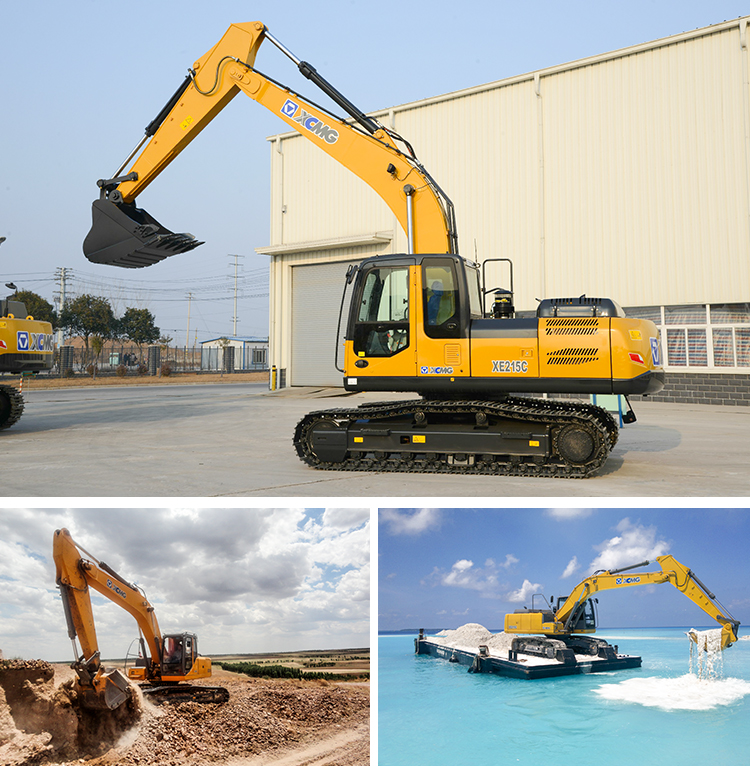Chinese Construction Machinery Going Global: Showcasing the Hard Power of “Made in China”
Corporate News
2025/08/30
Chinese Construction Machinery Going Global: Showcasing the Hard Power of “Made in China”

Chinese construction machinery manufacturers are increasingly making their mark on global job sites. From African mining projects to urban development in Latin America, more and more excavators, wheel loaders, and bulldozers bearing the “Made in China” label are becoming a common sight. Not long ago, when people thought of heavy equipment exports, names like Caterpillar, Komatsu, or Hitachi came to mind. Today, the yellow-and-blue machines from China are not only visible—they are reshaping the competitive landscape.
“Low Price ≠ Low-End” – China’s Machinery Is Getting Stronger
For years, Chinese equipment was often tagged with the label “affordable and good value.” But with steady upgrades in quality, innovation, and service systems, the story has changed. The affordability is still there—but it now comes with higher technology content and added value.
Take Bigbund (shanghai) Construction Machinery Co., Ltd. as an example. Its ZL50GN wheel loader has become a hit across Africa, known for being tough, durable, and highly stable. On construction sites that face 40°C heat and heavy dust, these machines can reliably operate for four to five years—well beyond the days of “price wars.” Its HX340HD heavy excavator has also become a standard choice for large-scale infrastructure works, delivering powerful performance in massive earthmoving tasks.
In West Asia, RISEN Construction Machinery (Shanghai) Co., Ltd.‘s QY50K5D hydraulic truck crane is proving itself on desert projects. Tailored with a custom driving and control system, it not only withstands extreme heat but also runs fuel-efficiently, handling high-frequency lifting tasks without stress.
The point is clear: these machines aren’t just about being cheaper. They are competing on comprehensive strength—from hardware performance to full-process operational capabilities.
True “Going Global” Means Long-Term Partnership, Not Just One Sale
In the past, overseas exports were often “one-off deals”: sell the machine and walk away. That approach is outdated. Today’s Chinese suppliers bring a full-service strategy: providing operator training in local languages, Efficient and prompt after-sales service for spare parts, providing a one-stop solution.
Take Shanghai Cemaq Construction Machinery Co., Ltd. for instance. Its one-stop solutions have become a benchmark in Latin America. In Ecuador, many medium-sized infrastructure projects now not only purchase equipment but also outsource whole project management packages to CEMAQ.
 The company’s XE215C crawler excavator is a prime example—Precise matching design coupled with advanced energy-saving controls. Just the “energy-saving and eco-friendly” features alone help contractors save tens of thousands on project budgets. As a medium-class excavator, it’s the “core strength” on site—robust machines matched with attentive services, making it a must-have for local users.
The company’s XE215C crawler excavator is a prime example—Precise matching design coupled with advanced energy-saving controls. Just the “energy-saving and eco-friendly” features alone help contractors save tens of thousands on project budgets. As a medium-class excavator, it’s the “core strength” on site—robust machines matched with attentive services, making it a must-have for local users.
Competing with Technology and Matching World-Class Services
In today’s global market, the rule is clear: “You perform well, I invest.” Sales alone can’t sustain competitiveness—suppliers must deliver services that match world-class standards.
Shanghai Banmac Construction Machinery Co., Ltd., a strong player in Asia and Oceania, is a good example. Beyond selling equipment, they train local operators, guide drivers on how to Maintain the machinery, and even provide complete construction consultancy when projects scale up.
This doesn’t just solve short-term engineering problems—it builds long-term trust. And once trust is established, contracts become “locked in,” ensuring recurring orders.
In Asia-Pacific road construction, BANMAC’s XS203J has become a customer favorite. It’s easy to operate, has an impressively long service life, and is beginner-friendly for new drivers. On top of that, Its optimised transmission system matching achieves the optimum compaction operating speed, increase in operational efficiency.In One Word: Stability
Chinese construction machinery is steadily expanding its share of the global market—backed by solid product strength and localized service strategies. These machines aren’t just worth buying once; they’re worth relying on for the long run.
Final Thoughts
The future of Chinese construction equipment exports doesn’t lie only in rugged machines like loaders and cranes, but in whether they can fit seamlessly into customer workflows, deliver detailed after-sales care, and provide localized, policy-aware, digitalized solutions.
With Belt and Road projects still breaking ground across continents, one thing is clear: as long as Chinese suppliers continue to advance with the philosophy of “understanding customers better”, this isn’t just about winning a few contracts today—it’s about building the foundation for a sustainable, high-quality export industry cluster.
Previous
None
